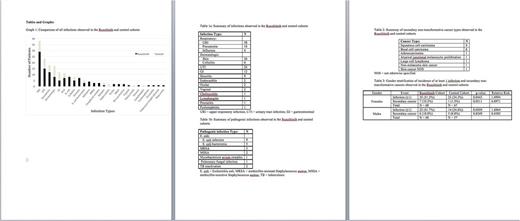Abstract
Introduction:
This is a retrospective, case-control study evaluating the incidence of infections and second cancers in Philadelphia-chromosome negative (Ph-) myeloproliferative neoplasm (MPN) patients treated with ruxolitinib, a JAK1/JAK2 tyrosine kinase inhibitor approved for treating patients with polycythemia vera (PV), primary myelofibrosis (PMF), post-essential thrombocythemia myelofibrosis (PET-MF), and post-polycythemia vera myelofibrosis (PPV-MF) [1]. These patients are at significant risk for infections and second cancers when treated with long-term ruxolitinib. Similar observations have been reported in the COMFORT-II clinical trial findings, which studied ruxolitinib use in myelofibrosis (MF) patients [2], and have real-world clinical implications.
Methods:
128 MPN patients treated with ruxolitinib were studied and matched with 122 control patients based on gender, disease subtype, and age at the beginning of an MPN treatment (± 5 years). All evidence of infections and second cancers during this treatment regimen were recorded.
Results:
MPN patients whose mean age was 67.2±11.2 years when starting ruxolitinib treatment were studied, among whom myelofibrosis (38.3%) and PV (33.6%) were the leading subtypes. Of patients in the ruxolitnib cohort, 60/128 (46.9%) presented with ≥1 infection and a second cancer occurred in 13/128 (10.2%) patients. Of patients in the control cohort, 37/122 (30.3%) presented with ≥1 infection and a second cancer occurred in 6/122 (4.9%) patients. The difference of these proportions was significant for both infections (p=0.0072, RR=1.5456) and second cancers (p=0.0006, RR=2.0651) (Graph 1). Types of infections and cancers are summarized in Table 1a, Table 1b, and Table 2 . Of note, 2 patients treated with ruxolitinib had tuberculosis (TB) reactivations and 1 patient had pulmonary aspergillosis. All 13 of the patients that were diagnosed with a second cancer after being treated with ruxolitinib were found to have ≥1 skin cancer.
Stratification of the incidence of these events by gender shows a trend for females treated with ruxolitinib with a higher relative risk (RR) of developing cancer than males of the same cohort (RR: 6.8971 for females, 0.4385 for males) (Table 3) . Serial upper respiratory infections (URIs) and urinary tract infections (UTIs) were of higher incidence in the ruxolitinib cohort than in the control cohort. In the ruxolitinib cohort, 7/21 (33.3%) and 5/12 (41.7%) experienced serial URIs and UTIs, respectively. In the control cohort, 1/9 (11.1%) and 0/8 (0.0%) experienced serial URIs and UTIs, respectively. 29/128 (22.7%) of the ruxolitinib cohort and 14/123 (11.4%) of the control cohort developed ≥2 different types of infections (p=0.0217, RR=1.9905).
When compared to the control cohort, patients in the ruxolitinib cohort were found to have a higher incidence of recurring neutropenia (ruxolitinib: 35/128 (27.3%), control: 22/123 (17.9%), p=0.0782, RR=1.5288). The ruxolitnib cohort had a higher incidence of elevated ferritin than the control cohort (ruxolitinib: 26/128 (20.3%), control: 6/123 (4.9%), p=0.0010, RR=4.1641). Elevated ferritin could be a factor contributing to the increased risk of developing certain types of infections owing to iron overload [3].
Conclusions:
Long-term ruxolitinib treatment in Ph- MPN patients has resulted in an increased risk of infections and second cancers when compared to a matched control cohort. Those patients also had significantly higher ferritin levels which may contribute to the increased risk of certain infections. The risk of secondary cancer was much higher in the ruxolitinib group and especially in females. The significant proportion of ruxolitinib-treated patients who developed skin cancer (13/128, 10.2%) emphasizes the importance of skin cancer screening in these patients.
Ritchie: Astellas Pharma: Other: Research funding to my institution; NS Pharma: Other: Research funding to my institution; Bristol-Myers Squibb: Other: Research funding to my institution; Celgene: Consultancy, Other: Travel, Speakers Bureau; Pfizer: Consultancy, Other: Research funding to my institution; Incyte: Consultancy, Speakers Bureau; Novartis: Consultancy, Other: Research funding to my institution, and travel, Speakers Bureau. Roboz: Cellectis: Research Funding; AbbVie, Agios, Amgen, Amphivena, Array Biopharma Inc., Astex, AstraZeneca, Celator, Celgene, Clovis Oncology, CTI BioPharma, Genoptix, Immune Pharmaceuticals, Janssen Pharmaceuticals, Juno, MedImmune, MEI Pharma, Novartis, Onconova, Pfizer, Roche Pharmace: Consultancy. Lee: Amgen: Consultancy; Baxalta: Consultancy; Alexion Pharmaceuticals: Consultancy; Clinipace: Consultancy.
Author notes
Asterisk with author names denotes non-ASH members.


This feature is available to Subscribers Only
Sign In or Create an Account Close Modal